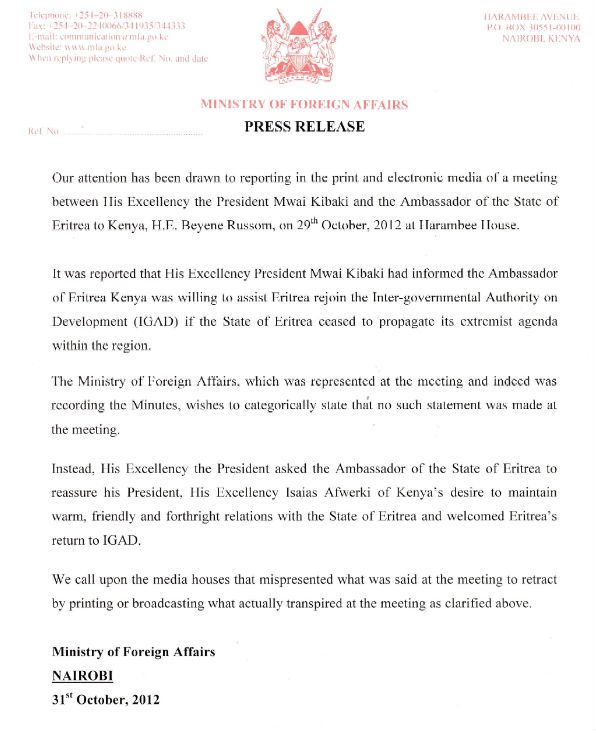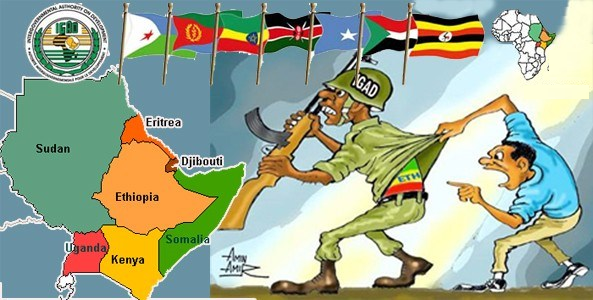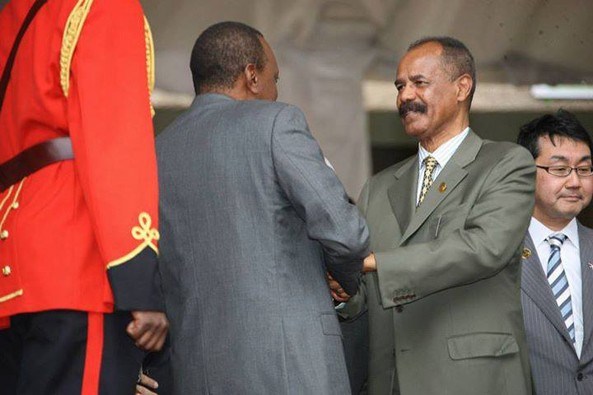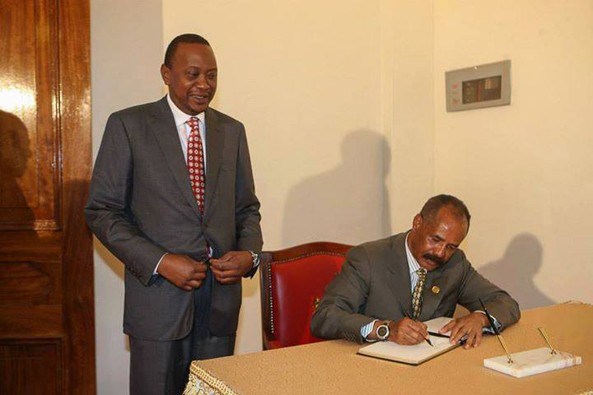Last week the internet was set ablaze due to a viral story published by The Standard based in Kenya regarding Eritrean government decree proclaiming polygamy legal. The story was proven not only to be false but various African and international media outlets were duped. It is not surprising as the Kenyan newspaper has a history of reporting inaccurate accounts as few weeks prior there was another false story on mini skirt being banned by Tanzania government.What is the connection and motives for Eritrea and Tanzania to be targeted with distorted untrue reports as these? Take the case of one story reported by The Standard in late April of 2015 that insinuated Eritrea was to blame for President Uhuru Kenyatta canceling the trip to the US after his flight was forced to turn back en route to Dubai.
“Informed sources familiar with aircraft routes, said President Kenyatta’s military jet could have been turned back on the skies over Eritrea, in what is turning out a clear escalation of the diplomatic bad-blood between the two countries.”
However the report turned out to be false as Eritrea’s Ambassador to Kenya stated: “The Government of Kenya sought permission to use the Eritrean airspace and it was granted and all the relevant communication was forwarded to the Ministry of Foreign Affairs and aviation authorities,”. The story was able to gain regional traction but did not reach international media attention compared to this week false polygamy story.Equally important is another story reported in October of 2012 in which Kenya warmly supported Eritrea return to IGAD but media put a distorted spin on the news in order give an impression of bad relations.The Kenya Ministry of Foreign Affairs in a press release declared the media got the report wrong:

Who are the anonymous “informed sources” that keep feeding distorted reports over the years that paint a perception of bad blood and a diplomatic row with Eritrea and Kenya?Is it plausible that the Ethiopian regime has direct opening to influence and shape Kenya private media by offering a financial incentive to media owners and senior editors? In fact, a study released by Friedrich Ebert Stiftung on Kenya’s media vulnerabilities asserts private media editorial leaning’s are influenced by media owners in pursuit of monetary and political gains:
“Private media in Kenya face immense commercial and political pressure that could erode their editorial independence. Media owners often curry favor with advertisers and sponsors of media products and services to secure or retain advertising contracts. For most media owners, commercial interests are more important than media independence. Media owners directly interfere with editorial decisions to preserve and protect the interests of big-time advertisers and sponsors. Commercial interests also come from shareholders and strategic business partners.”
GeoPolitical Motives
In a 2012 interview with Kenyan TV show Capital Talk former Deputy Speaker of the National Assembly of Kenya Farah Maalim said the following:
“We don’t have a foreign policy…Our foreign policy is always highjacked by another state whether it is a superpower or a country in the region.The first head of state [Isaias] Afewerki was a very close friend of our second president Moi[Daniel arap Moi].
They[Eritrea] go to pains now to tell you ‘look we are your brother and we are your friends why you want to make an enemy out of us’. Because Eritrea has a war with Ethiopia an issue that has gone to international court and determined by the international court which actually said is illegally occupying Eritrea land..they[Ethiopia] are the aggressors.We keep calling the Eritreans terrorist supporters …It is increasingly going to dawn on them we are doing this thing because somebody else is managing our foreign policy.
If we start taking sides and it becomes abundantly clear and open secret that we are doing the bidding for Ethiopia….Its like our foreign policy has been hijacked as far as the region is concern by Ethiopia..IGAD? there is no IGAD..IGAD is Ethiopia”
From 2007 to 2012 relations between Eritrea and Kenya were frosty due to influences of Ethiopian regime and Washington.The key development that shifted and increase tension was after Washington subsequently encouraged Ethiopian regime to invade Somalia in late 2006(WikiLeaks Reveals U.S. Twisted Ethiopia’s Arm to Invade Somalia). In protest, Eritrea by April of 2007 officially suspended its membership from IGAD after the regional body endorsed Ethiopian regime illegal invasion of Somalia. In its official notice of suspension the Government of the State of Eritrea stated the following:
“…The Government of Eritrea officially notifies with regret, to the current chair of the IGAD Assembly of Heads of State and Government that Eritrea has temporarily suspended its membership in the Intergovernmental Authority on Development (IGAD) effective 21st April 2007. The Government of the State of Eritrea took this difficult move in reaction to a number of resolutions passed pertaining to the worsening situation in Somalia, in the name of IGAD. The Eritrean Government is convinced that such resolutions go contrary to the core principles of IGAD in the promotion of peace and security in the region. Moreover, the resolutions taken recently are contrary to the previous IGAD & Security Council resolutions, in particular, the non-involvement of frontline countries in Somalia. Eritrea does not want to be part of this historical blunder, which is the main cause of anguish, destruction of property and loss of life of many innocent Somalis…”
“…Governments in the region that are wither condoning the invasion and domination of Somalia and the sufferings meted out to its people or that have chosen to keep silent, for reasons of narrow self-interest or due to lack of information cannot, ultimately, shrug their responsibilities…For its part, Eritrea is not willing to endorse invasion and domination under the umbrella of IGAD and be party to the atrocities perpetrated against the Somali people in contravention of justice and truth…”
Following Eritrea decision to suspend its membership, the Ethiopian regime held IGAD chairmanship captive (IGAD: A Regional Organization Or A Forum Run By Ethiopia?).After 2007 with Eritrea out of IGAD Washington had more room to maneuver and place sanctions on Eritrea for facilitating a peace conference. The 2007 Somalia conference hosted in Eritrea was independent of Washington and was politically inclusive platform similar to the successfully East Sudan peace deal signed in Asmara which ended the armed conflict. During the conference, Eritrea brought together various lawmakers, civil society organizations, business class and with representation from the Somali diaspora which could have led to reconciliation and possibly ended in an independent Somalia government owned by Somali unlike now in which Somalia is under Ethiopian colonial rule.Eritrea in 2007 even hosted Sharif Sheikh Ahmed before he become president of Somalia and double crossed Eritrea by joining Ethiopian regime as a lackey that antagonize Eritrea willingly.In fact, Ethiopian regime hijacking IGAD was a strategic win for Washington to give the impression it was directly an African initiative that led up to supporting its concocted sanctions on Eritrea.

IGAD under Ethiopian regime control
“..Thirty-five sessions of the IGAD policy-organs, amounting to half of all the sessions held since the revitalization of IGAD in 1996, were chaired by the leaders of a single Member State: Ethiopia. Moreover, Ethiopia has had a disproportionate advantage in terms of hosting IGAD meetings. Since June 2008, it hosted in Addis Ababa all but two IGAD Summits, and sixteen out of the twenty-four sessions of the Council of Ministers.”
Furthermore, a leaked memo from Ethiopia’s foreign ministry reported by journalist Matthew Russel Lee indicates the Ethiopian regime was conspiring to isolate Eritrea from gaining Kenya’s supports and other neighboring states in lifting the illegal sanctions manufactured by Washington. The allegation and main motivation for sanctions that were placed on Eritrea turned out to be proven false by UN reports but despite lacking evidence Washington and the Ethiopian regime are lobbying to keep it intact.
Undeniably the Ethiopian regime is a destabilizing force in the Horn of Africa acting as a proxy for the west.For instance, in May of 2015 heavily armed Ethiopian soldiers entered Kenyan border without proper notification or permission from Kenyan government and again few months later Ethiopian soldiers invaded Kenya and killed three police officers. Kenya’s government strikingly responded quietly behind the scene to Ethiopian regime routine illegal incursion and direct violation of Kenyan territorial integrity.
Kenya-Eritrea Relations
Bilateral relations between Kenya and Eritrea have improved under President Uhuru Kenyatta compared to those frosty years under his predecessor. Eritrea and Kenya currently continue to have fruitful diplomacy and growing link in the educational field. In 2013 President Uhuru gave an invitation to the president of Eritrea to attend Kenya’s 50th independence jubilee celebration and the president was warmly received.After the president of Eritrea visit, there was greater effort in exchanging of higher learning opportunities between the two sisterly nations. In 2013 six Ph.D. students were sent to Kenya and as of 2015 Eritrea has hired 35 expatriate lecturers in institutions of higher education.

President of Eritrea warmly embraced by President Uhuru Kenyatta during Kenya’s 50th Independence Day celebration

President of Eritrea with President Uhuru Kenyatta during Kenya’s 50th Independence Day celebration
Finally, it can be concluded there is a possibility to suspect Ethiopian regime could be behind Kenyan private media attempts to drive a wedge between the government of Eritrea and Kenya. Washington through its Ethiopian proxy regime still continues to enact a failed policy of containing and isolating Eritrea from the region and international community. Therefore distorting Eritrea’s position and reputation in the African and international media is part of that isolation drive.